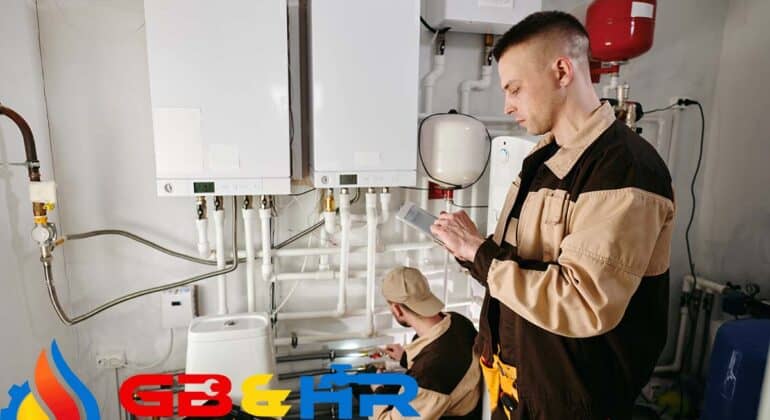Perhaps you are one of the lucky few homeowners who have never had to look at the boiler pressure gauge and note that it is too low. However, a lot of people who have a heating system have experienced their boiler losing pressure.
Modern boilers require very little apart from their annual service and occasionally checking their pressure gauges. If the pressure is too low, the system will not function correctly.
Don’t let boiler pressure issues leave you in the cold—if you can’t or don’t want to fix it yourself, contact us today at 07795034003 for and our engineers will fix your boiler and restore its optimal performance and address any other heating problems you may have!
In the following guide, you will find out more about boiler pressure, what causes the problem of low boiler pressure and how to fix it.
What is boiler pressure?
Boiler pressure is the amount of water circulating in the heating system, measured in bars. It is crucial for maintaining the efficiency and effectiveness of your boiler system. The pressure gauge on your boiler provides a visual representation of the current pressure level, typically found on the boiler’s control panel.
Importance of boiler pressure
Maintaining a constant boiler pressure is essential for efficiently operating your heating system. Low boiler pressure may not necessarily damage your boiler or central heating system, but it can significantly affect their performance. Efficient heating requires steady pressure to distribute hot water throughout the system adequately.
Identifying Low Boiler Pressure
How to check your boiler’s pressure gauge
Most modern combi boilers come equipped with a built-in pressure gauge. Usually, there are green and red zones on it. The green zone indicates the safe pressure range (typically between 1-2 bars), while the red zone signals high or low-pressure danger zones. To check your boiler pressure, locate the pressure gauge on the control panel and check the needle’s position.
What are the symptoms of boiler pressure loss?
There are a few telltale signs that show your heating system is experiencing low boiler pressure.
- Hot water and heating are disrupted
- Radiators are not warming up as they should
- The pressure gauge dial indicates low boiler pressure
Causes of Low Boiler Pressure
Drops in the pressure of your central heating system are most commonly due to a leak in the system. It also occurs after bleeding your radiators or due to a broken boiler. Here are the specifics.
Leaks in the system
Leaks are the most common cause of boiler pressure loss. They can occur at various points within the system, including:
- Radiator valves: Leaks often happen at the joints where pipes connect to radiators.
- Pipes and joints: Small leaks can develop in the pipework and soldered joints over time.
- Radiators: Corrosion or damage to radiators can cause pinhole leaks that are hard to detect.
You recently bled your radiators
Bleeding the radiators releases trapped air, which can cause a drop in boiler pressure. After bleeding, the lost air needs to be replaced with water to restore pressure.
Faulty boiler components
Malfunctions in boiler components can also lead to pressure loss. Important parts to check include:
- Pressure relief valve: This valve releases excess pressure to prevent damage. When the pressure relief valve malfunctions, normal boiler pressure drops low.
- Internal seals and valves: Worn or damaged seals and valves can leak, reducing system pressure.
It is important to have your boiler inspected by a gas safe registered engineer. That is the best way to avoid high repair costs and keep boiler systems at their peak performance.
Apart from fixing or replacing faulty components, a heating engineer can also run a diagnostic of the system. They can determine if there are boiler leaks and ensure no problem persists. With the help of a professional, you can achieve the ideal boiler pressure and have your system serviced in no time.
How to Fix Low Boiler Pressure Step by Step
If your boiler pressure is too low you can take steps to repressurise the system. The good news is that you can usually do this yourself in a few steps:
Turn off the boiler
The first thing you should do is turn off the boiler. It needs to cool before you continue with the procedure.
Look for the filling loop
Underneath the boiler, there should be a flexible braided hose that links two pipes. This is the filling loop and it has levers on both ends to work the valves. If there is no such thing, your boiler may have an internal keyless filling loop. You should check the boiler manual if you can’t find this component.
Open the valves
Turn the valves so that the levers align with the direction of the braided hose. As you do, you will hear water running and the boiler pressure gauge will go up. When it goes up to around 1.2 bar, shut off both valves.
Observe for leaks
Keep note of the pressure gauge. It should stay up at this point. If it starts dropping, check for a leaking pipe. If there is no such issue, you should power up the boiler again.
Check for the correct boiler pressure
After running the boiler again for some time after cooling down and resetting, it’s time to check the pressure again. If it hasn’t dropped significantly, there is no problem. That is how you fix low boiler pressure.
You should not need to top up the pressure too often
Any qualified heating engineer will tell you that topping up the boiler pressure is a routine task you should perform once or twice a year at maximum. If the pressure drops more often than that, it is likely time to have a professional inspect the system and do some necessary repairs. Keep in mind that a problem like this could be due to a water leak that is not immediately obvious. It’s another reason to consult with an expert.
When to Call a Gas-Safe Engineer?
Criteria for hiring a Gas Safe Engineer
- Gas Safe Registration: Ensure the engineer has a valid Gas Safe identification card, proving their authorization to work on gas appliances.
- Track Record and Reviews: Look for local installers with a good reputation and positive customer feedback.
Risks of a DIY fix for low boiler pressure
- Compromise to Personal Safety: Incorrect handling of boiler components can lead to gas leaks and severe health hazards.
- Voiding Warranty: Unauthorized repairs might invalidate your boiler’s warranty, leading to costly implications.
In conclusion
While low boiler pressure is not inherently dangerous, it can lead to inefficient heating and higher energy bills if not addressed promptly. Regularly checking your boiler’s pressure and understanding how to re-pressurise the system can help maintain optimal performance.
However, for persistent issues or if you’re unsure, it’s always best to call a qualified Gas Safe engineer. Gas Boiler & Heating Repair is a safe bet to restore pressure in your boiler. Our engineers have years of experience and can easily detect and fix any problem like lower boiler pressure. Give us a call and book a visit from our experts.
Frequently Asked Questions:
Can a boiler lose pressure without a leak?
There can be many reasons for the boiler losing pressure. It could be due to problems with the pressure relief valve or a faulty expansion vessel.
Why does my boiler lose pressure?
One of the most common reasons for low pressure in your boiler is releasing water and air when bleeding your radiators. A leak in the appliance or one of its components is another likely cause.
How to detect leaks causing pressure loss?
Check around your radiators and damp patches near pipe connections. Be on the lookout for water stains and discolouration of skirting boards and pipes.
Is regular pressure drop normal?
Boilers tend to use a little bit of pressure slowly over time. Repressuring the system is an easy way to fix this. If it occurs too often, it is an indication of a problem that needs to be fixed.
How often should I check boiler pressure?
Check boiler pressure once a month. It should not be too high or too low. Make sure to also check pressure after bleeding your radiators, as that’s when you will most likely need to fix the pressure.
Can hot water affect boiler pressure?
It is usual for boiler pressure to increase when the water gets heated and to decrease when the water cools down.


